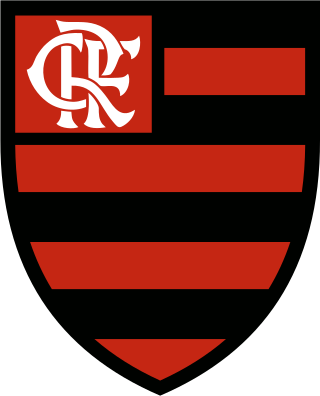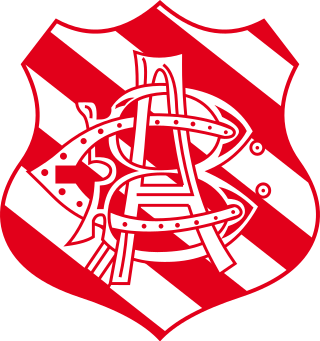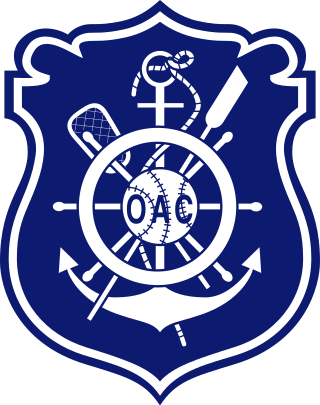
Clube de Regatas do Flamengo, more commonly referred to as simply Flamengo, is a Brazilian multi sports club based in Rio de Janeiro, in the neighborhood of Gávea, best known for their professional football team. They are one of two clubs to have never been relegated from the top division, along with São Paulo. Flamengo is the most popular team in Brazil with more than 46.9 million fans, equivalent to 21.9% of the population that supports a team in Brazil.

Fluminense Football Club is a Brazilian sports club based in neighbourhood of Laranjeiras, in Rio de Janeiro, being the oldest football club in the state since its foundation in 1902. Competes in the Campeonato Brasileiro Série A, the first tier of Brazilian football, and the Campeonato Carioca, the state league of Rio de Janeiro. The word "fluminense" is the gentilic given to people born in the state of Rio de Janeiro, in Brazil.

Club de Regatas Vasco da Gama, commonly referred to as Vasco da Gama or simply Vasco, is a sports club based in Rio de Janeiro, Brazil. Although originally a rowing club and then a multi-sport club, Vasco is mostly known for its men's football team, which currently competes in the Campeonato Brasileiro Série A, the top tier of the Brazilian football league system, and in the Campeonato Carioca, the state of Rio de Janeiro's premier state league.

Maracanã Stadium, officially named Journalist Mário FilhoStadium, is an association football stadium in Rio de Janeiro, Brazil. The stadium is part of a complex that includes an arena known by the name of Maracanãzinho, which means "The Little Maracanã" in Portuguese. Owned by the Rio de Janeiro state government, the stadium is now managed by the clubs Fluminense and Flamengo. It is located in the Maracanã neighborhood, named after the Rio Maracanã, a now canalized river in Rio de Janeiro.

Santa Cruz Futebol Clube is a Brazilian professional football club based in Recife, Pernambuco, that used to compete in the Série D, the fourth tier of Brazilian football, and competes in the Campeonato Pernambucano, the top flight of the Pernambuco state football league.

Sport Club do Recife, commonly known as Sport Recife, is a Brazilian sports club, located in the city of Recife, in the Brazilian state of Pernambuco. Founded in 1905, the club currently plays in Série B. In football, the club has won six CBD/CBF titles, including three national and three regional. Its greatest achievements are winning the 1987 Brazilian Championship and 2008 Copa do Brasil. In addition to professional football, the club also participates in women's football and Olympic sports, such as rowing, swimming, hockey, basketball, futsal, volleyball, table tennis, taekwondo, judo and athletics. Their historical rival is Náutico, and they both dispute the Clássico dos Clássicos. The derby against Santa Cruz is called the Clássico das Multidões, while the derby with América is called the Clássico dos Campeões.
Antônio Maria de Araújo Morais, known as Antônio Maria, was a Brazilian writer of pop music lyrics as well as radio sports commentator, poet, composer, and chronicler.

Nelson Falcão Rodrigues was a Brazilian playwright, journalist and novelist. In 1943, he helped usher in a new era in Brazilian theater with his play Vestido de Noiva , considered revolutionary for the complex exploration of its characters' psychology and its use of colloquial dialogue. He went on to write many other seminal plays and today is widely regarded as Brazil's greatest playwright.

Bangu Atlético Clube, commonly known as Bangu, is a Brazilian professional association football club based in Rio de Janeiro, in the western neighbourhood of Bangu. The team plays in Série D, the fourth tier of the Brazilian football league system, as well as in the Campeonato Carioca, the top tier of the Rio de Janeiro state football league.

Olaria Atlético Clube, usually abbreviated to Olaria, is a Brazilian football club established in 1915, since expanded into other sports. Mostly known for its Brazilian football team based in the city of Rio de Janeiro, in the neighbourhood of Olaria. The team competes in the Campeonato Carioca Série A2, the second tier of the Rio de Janeiro state football league.

Fla–Flu is an association football derby between Flamengo and Fluminense, considered one of the biggest rivalries in Brazilian football. Their matches usually take place at the famous Maracanã Stadium, located near downtown Rio de Janeiro, in the Maracanã district. The Fla–Flu holds the world's record football match attendance of 194,603 people in a 1963 derby.

The Copa Rio was the first international club football tournament with teams from Europe and South America, having been held on two occasions, in 1951 and 1952, in Brazil. Both editions were organised and endorsed by the Brazilian Sports Confederation, the then Brazilian FA and sports main body. The tournament is often regarded in Brazil as an official tournament, at least as far as the Brazilian clubs are concerned. The name Copa Rio, Portuguese for Rio Cup, was a homage to Rio de Janeiro City. The 1951 edition of the competition was also hailed as "Club World Cup" or "World Champions Cup" by the Brazilian FA and press. Though some previous club competitions may have been hailed as "the club world contest", Copa Rio was the first attempt at creating a Club World Cup with intercontinental reach.
The 1980 Campeonato Brasileiro Série A, was the 24th edition of the Campeonato Brasileiro Série A.
The 2015 Copa do Brasil Third Round will be played from 20 May to 22 July 2015 to decide the 10 teams advancing to the knockout rounds. Different than the first two rounds, in this round the away team that wins the first match by 2 or more goals do not progress straight to the next round avoiding the second leg. The order of the matches was determined by a random draw. This phase had a pause during the 2015 Copa América.

Aderbal Freire Filho was a Brazilian actor, theatrical director and television presenter.
The history of football in Brazil began in 1895 through the English, as in most other countries. The first teams began to form during this period, but, as well as the foundation of the clubs, the practice was also restricted to the white elite. According to reports, the first football ball in the country was brought in 1894 by Charles William Miller. However, the oldest records of football in Brazil date back to 1875, in Curitiba. The aristocracy dominated the football leagues, while the sport was gaining popularity in the countryside. Blacks and the poorer sections of the population could only watch. It was only in the 1920s that blacks were accepted as the sport became more widespread, especially with professionalization in 1933.

Events in the year 2019 in Brazil.
The 1981 football season is Clube de Regatas do Flamengo's 86th year of existence, their 70th football season, and their 69th season in the top division of the Campeonato Carioca, the Rio de Janeiro state football league. In addition, it is their 11th in the top division of the Brazilian national football league, having never been relegated from either. Internationally, Flamengo participated in the 1981 Copa Libertadores, qualifying through winning the 1980 Brazilian Série A Championship.
Mário Caetano Filho, better known as Marinho is a Brazilian former professional football player who played as a centre-back. He is most well-known for his time at Flamengo beginning in 1980.
The 2022 Campeonato Carioca de Futebol was the 119th edition of the top division of football in the state of Rio de Janeiro. The competition was organized by FERJ. It began on 25 January 2022 and ended on 2 April 2022.













